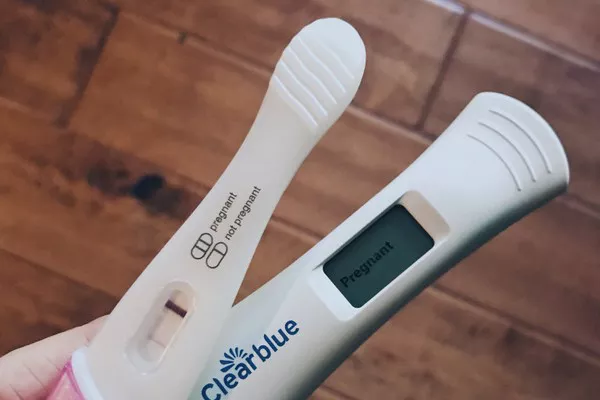Discovering a pregnancy is a momentous and often highly anticipated event in one’s life. However, the journey begins with the result of a pregnancy test, and when that result yields a faint line at 4 weeks, questions and concerns may arise. This comprehensive article aims to unravel the mysteries behind faint pregnancy test lines, exploring the scientific, emotional, and practical aspects of this common occurrence.
Understanding Early Pregnancy Testing:
Before delving into the reasons behind faint pregnancy test lines, it’s crucial to comprehend the basics of early pregnancy testing. Pregnancy tests work by detecting the presence of human chorionic gonadotropin (hCG), a hormone produced during pregnancy, in urine. The sensitivity of a pregnancy test determines how early it can detect hCG, and this varies among different brands and types of tests.
Sensitivity Levels and Test Variability:
Pregnancy tests come with varying sensitivity levels, measured in milli-international units per milliliter (mIU/mL). Some tests are more sensitive and can detect lower hCG concentrations, offering the possibility of earlier detection. However, the variability in sensitivity among different tests can contribute to variations in the intensity of test lines, leading to faint results.
Natural Fluctuations in hCG Levels:
At 4 weeks of pregnancy, hCG levels are still relatively low. The hormone begins to rise after implantation, which typically occurs around 6-12 days after fertilization. Faint test lines at 4 weeks may be attributed to the natural variability in hCG levels during early pregnancy, as it takes time for the hormone to accumulate and become detectable.
Common Reasons for Faint Pregnancy Test Lines at 4 Weeks:
1. Early Pregnancy Stage:
At 4 weeks, the embryo is just beginning to implant into the uterine lining, initiating the release of hCG. The low levels of hCG during this early stage may result in a faint test line. It’s essential to recognize that a faint line does not diminish the validity of the result; it simply indicates the early stage of pregnancy.
2. Dilution of Urine:
The concentration of hCG in urine can vary based on factors like hydration levels and the time of day. If the urine is overly diluted, it may affect the intensity of the test line. To obtain accurate results, experts recommend testing with the first morning urine, which is more concentrated.
In some cases, a faint test line may be associated with an ectopic pregnancy, where the embryo implants outside the uterus, commonly in the fallopian tubes. Ectopic pregnancies can lead to lower hCG levels than expected for gestational age, resulting in a faint line. If there is concern about an ectopic pregnancy, seeking medical attention is crucial.
4. Impending Pregnancy Loss (Miscarriage):
Unfortunately, a faint test line at 4 weeks may indicate an impending pregnancy loss or miscarriage. Low or decreasing hCG levels can lead to faint lines. If accompanied by symptoms like vaginal bleeding or abdominal pain, it is vital to consult a healthcare professional for appropriate evaluation and guidance.
Navigating the Emotional Aspects:
Experiencing a faint pregnancy test line can evoke a range of emotions, from excitement and hope to anxiety and uncertainty. It’s essential for individuals to recognize and address the emotional aspects of early pregnancy testing, fostering a supportive environment for those navigating this delicate phase.
Managing Expectations:
Understanding that faint test lines are common at 4 weeks and do not necessarily indicate a problem is crucial for managing expectations. Every pregnancy is unique, and variations in hCG levels are normal. Comparing experiences with others may lead to unnecessary anxiety, as each woman’s journey is distinct.
Open Communication:
Open communication with a partner, family members, or friends can provide invaluable emotional support. Sharing concerns, hopes, and uncertainties allows individuals to feel understood and supported during the early stages of pregnancy testing.
Seeking Professional Guidance:
If there are concerns about the intensity of the test line or any associated symptoms, seeking professional guidance is recommended. Healthcare providers can conduct blood tests to measure hCG levels and perform ultrasounds to assess the viability of the pregnancy.
Practical Considerations for Confirming Pregnancy:
Repeat Testing:
If a faint test line prompts uncertainty, repeating the pregnancy test after a few days can offer clarity. With the progression of pregnancy, hCG levels should increase, leading to a more pronounced test line.
Digital Pregnancy Tests:
Consideration of using a digital pregnancy test, which provides a clear digital result (e.g., “pregnant” or “not pregnant”), may alleviate the ambiguity associated with interpreting faint lines. Digital tests typically have a set threshold for hCG detection.
See Also: Blood vs. Urine Pregnancy Tests: Which One is More Accurate?
Conclusion:
Navigating the complexities of a faint pregnancy test line at 4 weeks involves a combination of understanding the science behind early pregnancy testing, recognizing potential reasons for faint lines, and addressing the emotional and practical aspects of this transformative period. By embracing the uniqueness of each pregnancy journey and seeking timely professional guidance when needed, individuals can approach early pregnancy testing with informed confidence and resilience.


